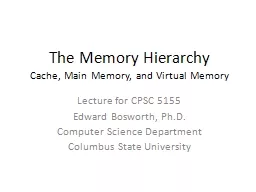PPT-Memory and thought:
Author : sherrill-nordquist | Published Date : 2016-05-29
why we cant have one without the other Rachel Hawkes Language World 2015 No empirical support for Using praise lavishly Allowing learners to discover key ideas
Presentation Embed Code
Download Presentation
Download Presentation The PPT/PDF document "Memory and thought:" is the property of its rightful owner. Permission is granted to download and print the materials on this website for personal, non-commercial use only, and to display it on your personal computer provided you do not modify the materials and that you retain all copyright notices contained in the materials. By downloading content from our website, you accept the terms of this agreement.
Memory and thought:: Transcript
Download Rules Of Document
"Memory and thought:"The content belongs to its owner. You may download and print it for personal use, without modification, and keep all copyright notices. By downloading, you agree to these terms.
Related Documents














